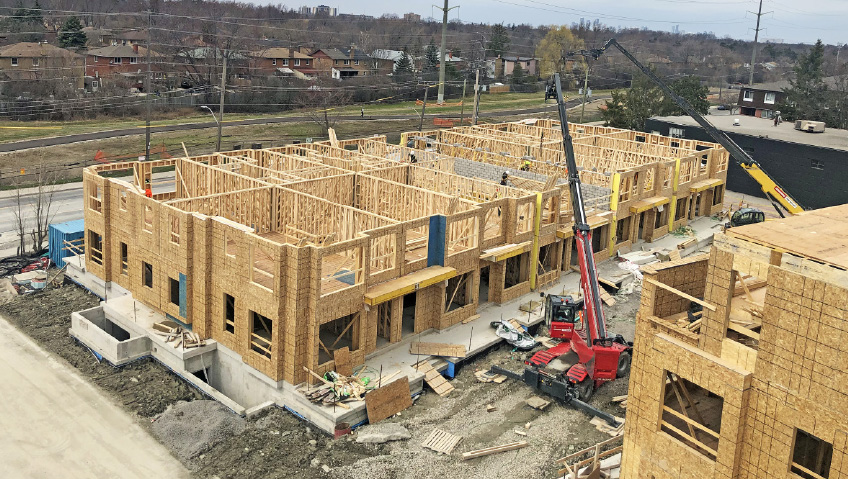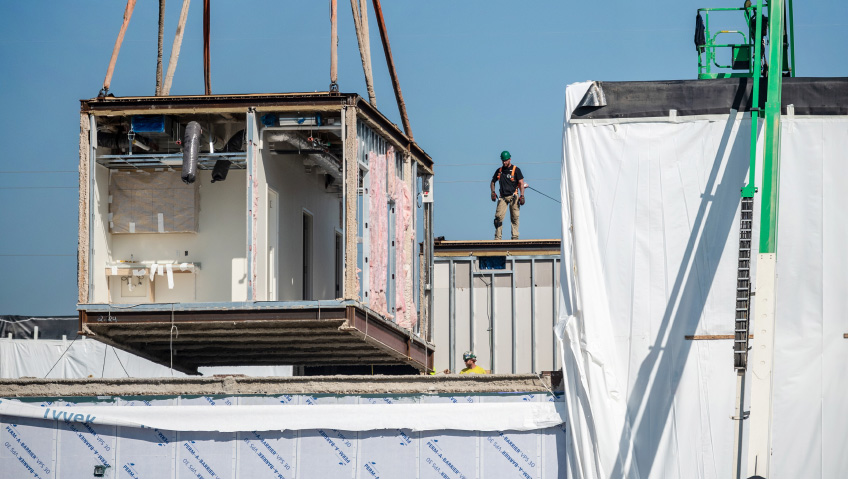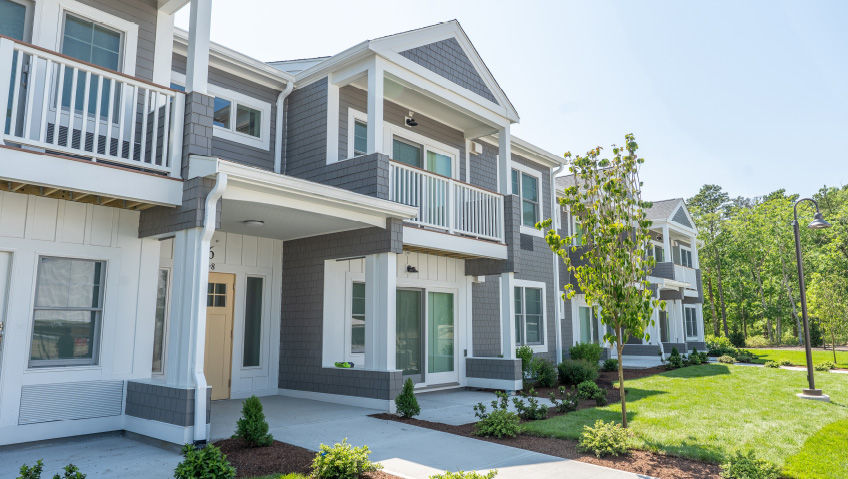Panelized Building Solutions (PBS) of Toronto, Ontario was launched in 2013, and has made great strides in growing the business. Vice President of Operations Paul Marchesani started running the company with the founder, Vince Leto, in 2020 and it has seen greater strength and diversification ever since, as well as increased capacity and new builders added to its roster.
Offsite construction and prefabrication is an interesting business, explains Marchesani, because of the degree of control Panelized Building Solutions has over the work. The company does not, in truth, share this space with a lot of competitors thanks to the unique approach it takes. PBS does not sell its panels to other framing contractors or builders but instead provides a supply-and-install package for its customer base, coupled with top-tier client communications and services.
“Where we excel is the service,” Marchesani affirms. “We control all aspects from the time the builder has the design, to curating materials… to production and panel design, to installation.”
As housing shortages are front of mind across both the Canadian and international construction markets, PBS seeks to counter them by offering off-site home construction. Marchesani explains that the company essentially pre-fabricates an entire house in a factory, thereby reducing the possibility of material shortages and offering the builder a greater comfort level as well. In fact, managers on a building project needn’t have to worry about logistics at all, as PBS is happy to take that kind of work off the plate of its customers.
“Typically, our installation foreman will coordinate with a PBS logistics manager and deal with any scheduling internally, leading to less friction between parties and greater peace of mind for the builder,” explains Marchesani. This is indicative of the high degree of communication that PBS encourages in its client relationships, as builders come to rely on the company to point out anything in their architectural plans that needs to be altered or improved.
A deep study of a client’s plans and assisting in the editing of those plans is another part of the company’s offering. Marchesani has spoken with several clients over the years who praise the company for this communicative and helpful approach, adding that they feel they can sleep better at night because of the level of comfort PBS provides.
Since Construction in Focus’ previous article on the business in 2021, PBS has added another two wall lines to its production lineup, as well as greater capacity on its production floor and more roof production. A great deal more exposure for the company has also been generated in that time, as it has continued to expand its client base. PBS intentionally deals with both mid-sized and larger builders needing 250 to 500 homes a year as well as smaller builders with 50 to 150 homes annually, which gives it a bigger overall pool of builders with which to work.
The company has built upon both its service and its engineering capacity, Marchesani adds proudly. Speaking to the latter improvement, he remembers how engineering tasks used to be contracted outside of the business but have now been brought completely in-house, allowing for a greater degree of control for roof and floor engineering.
Marchesani shares that many of the bigger builders are gearing up for a busy future. 2025 is being earmarked as a big start year for housing, as government initiatives at every level call for more housing. This has led to a lot of calls from builders to PBS, who is ready to meet the demand. Today’s builders, he feels, are secure in calling on PBS because of its ability to reliably produce a large volume, but he has a bit of doubt if 2025 will see that specific level of predicted growth, especially as some industry trades integral to housing—manufacturers of windows, bricklayers, and siding—are back-ordered significantly or are seeing a significant shortage in their skilled trade. PBS also continues to proudly work together with the Ontario Home Builders Association and agrees with its values of creating more homes and greater construction safety, issues that will only become more important in the upcoming years.
As has become clear in many industries, the shortage of labour continues to be a real issue. PBS is at the forefront of dealing with this because the nature of its offsite construction and prefabrication work cuts down on labour and building time. Marchesani adds that only about three to four workers total are required to site install a house. Onsite installation takes approximately half the time of the traditional stick build.
Cranes are crucial for offsite construction and prefabrication work and are necessary to the entire process, especially to framers. PBS owns twenty mobile telescopic rotating handlers purchased exclusively from Italian manufacturer Magni Telescopic Handlers and its North American distributor, Stanmore Equipment Ltd. Marchesani affirms that putting two to three cranes on a site to serve the framers is “like having ten guys on a job,” and that cranes are an all-important asset to any job on which the company embarks.
Although he admits that this swift timeline has led to some criticism that PBS is too quick in its methods, he feels that not enough other trades are doing this kind of work to improve, which can lead to delays in the building process. However, Marchesani and PBS are hopeful that the housing demand can be met by today’s builders and that any interruptions will ultimately be dealt with.
The company’s plans for the rest of the year and beyond are to continually improve its service, especially to see where else it can provide more service to the builder. Marchesani’s credo around this is, ‘How do we make it easier for them?’ For example, the company has just invested in a temporary stair production line to be used during construction projects before permanent stairs are built, and this is another small way that it can take more off the plate of clients during a project.
PBS celebrates its first decade in business in 2023, during which time Marchesani and his crew have learned quite a lot. Chiefly, he names service as a key takeaway. “We get [so many] compliments on how our service is worth it… you can be a premium [service provider], but not if you don’t give good service.”
If the builder client does not see a speed and quality benefit, then it likely is not worth the price point, so being a one-stop shop for builders has been critical to the company’s success. Controlling all aspects of the business and bringing as much in-house as possible to control the whole process has been one of the best decisions PBS has made for itself in its opening decade. Marchesani sums up what the company can and will do for its clients: “Give us basements and concrete, and we’ll take care of the rest.”






